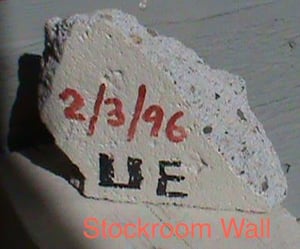Twenty-two years ago, a symbol of huge ideological differences was demolished. Ronald Regan’s now famous speech at the Berlin Wall, given two years before the actual demolition, confirmed a shift in thinking that had begun well before his visit. By the time of the President’s visit to the wall, the tides had pretty much turned. As James Carse notes, major shifts in thinking occur when concepts are no longer taken seriously. This is a gradual process where differences lessen in small steps, not overnight, sort of like continuous improvement.
I have a small chunk of the Berlin Wall given to me by a German friend. But another chunk of wall (seen below) is more pertinent to today’s blog. In 1996, the stockroom wall at my company was knocked down to improve workflow. Our maintenance supervisor, Manny Sousa, grasped the significance of this event and presented me with the souvenir. In fact, the actual stockroom was dismantled years before this and stockroom employees became production employees. But the wall remained as a relic.
There was a time about a decade earlier when the wall stood for something. It created a large fortress to protect our considerably valuable assets. Leaving the assets unprotected would have violated the ideology of the time. In those days, no one would have dared to suggest that we tear the wall down.
But by 1996 when the wall came down (over a weekend) the only complaints by anyone were about the dust left behind. The wall now stood for an ideal that very few employees took seriously anymore. What the keepers of the inventory -- the schedulers, the buyers – had come to realize was that by eliminating the reasons that inventory was needed, they could live happier, more productive lives with far less. How did they reach this understanding? Through the tacit learning that accompanies many small changes for the better: continuous improvement.
Recently, I had an opportunity to join a group of consultants for a tour of a large local company. The organization had made some nice improvements, but was looking for additional sets of eyes on the process. From the start of the visit there was a slight uneasiness in the group interaction. There were differing ideologies: push versus pull, batch versus one-by-one, local efficiency versus system efficiency, leverage versus collaboration. When these topics arose, heels dug in, postures stiffened, words became curt. There was the wall. I wanted to say “Tear down this wall” but the time was not yet right. There were still too many persons in the group who took the wall seriously. More tacit learning required.
What are your walls, real or figurative? Who still takes them seriously? What’s your plan to relax that posture? Let me hear from you.
O.L.D.


